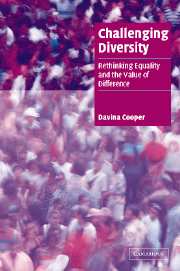Book contents
- Frontmatter
- Contents
- Acknowledgments
- 1 Introduction: mapping the terrain
- 2 Diversity politics: beyond a pluralism without limits
- 3 From blokes to smokes: theorising the difference
- 4 Towards equality of power
- 5 Normative encounters: the politics of same-sex spousal equality
- 6 Getting in the way: the social power of nuisance
- 7 Oppositional routines: the problem of embedding change
- 8 Safeguarding community pathways: ‘possibly the happiest school in the world’ and other porous places
- 9 Diversity through equality
- Bibliography
- Index
- Cambridge Cultural Social Studies
5 - Normative encounters: the politics of same-sex spousal equality
Published online by Cambridge University Press: 22 September 2009
- Frontmatter
- Contents
- Acknowledgments
- 1 Introduction: mapping the terrain
- 2 Diversity politics: beyond a pluralism without limits
- 3 From blokes to smokes: theorising the difference
- 4 Towards equality of power
- 5 Normative encounters: the politics of same-sex spousal equality
- 6 Getting in the way: the social power of nuisance
- 7 Oppositional routines: the problem of embedding change
- 8 Safeguarding community pathways: ‘possibly the happiest school in the world’ and other porous places
- 9 Diversity through equality
- Bibliography
- Index
- Cambridge Cultural Social Studies
Summary
The logic of marriage … is little more than a rationalization of privilege and will contribute to greater, not less, inequality within the lesbian and gay communities, as well as in the wider society.
(Carrington 1999: 223)From the mid-1990s, partnership recognition and gay marriage emerged to dominate lesbian and gay politics around the globe (see, e.g., Wintemute and Andenæs 2001). For many gay civil rights activists, spousal status had become a fundamental equality demand; some even declared it to be a basic human right (e.g., Wolfson 1996: 82). At the same time, others adopted a questioning attitude towards the clamour for official recognition (e.g., Boyd 1999; Herman 1990). For many critics, marriage remained a symbol of and means of perpetuating gender oppression, privatisation and state control.
In this chapter, I explore spousal recognition from the perspective of equality. However, in doing so, I want to move away from the question of whether marriage or spousal rights benefit lesbians and gay men as a class. For reasons explored in the previous two chapters, I find a class or group-based paradigm of equality politics, with its emphasis on raising a defined constituency to the standard experienced by dominant groups, unhelpful. At the same time, I want to avoid an approach which evaluates marriage and spousal recognition as if they exist in a vacuum.
- Type
- Chapter
- Information
- Challenging DiversityRethinking Equality and the Value of Difference, pp. 91 - 117Publisher: Cambridge University PressPrint publication year: 2004

